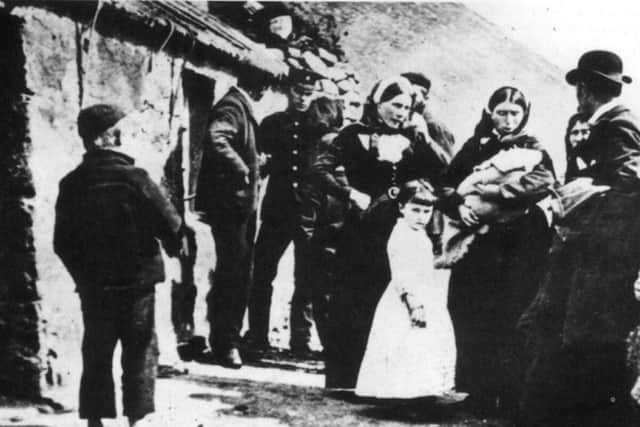New book tells story of 'hero of the poor' who raged against Highland Clearances
He was regarded by many as a crusader, radical, and champion of the oppressed, who stood up for and came to the aid of the poor during one of the most shameful chapters in Scottish history. Yet others viewed him as little more than a liar and fantasist who had been arrested for forgery.
Now, the little known story of Donald Ross, a lawyer, journalist, and fundraiser who raged against the Highland Clearances, and helped raise funds for impoverished families as far afield as the Outer Hebrides and the slums of Victorian Glasgow, is being retold for a new generation.
Advertisement
Hide AdAdvertisement
Hide AdAlthough the mass depopulation of the Highlands and islands has been the subject of extensive research since the mid 20th century, the part played by Ross has remained little more than a footnote. He is best known as a pamphleteer, who wrote lengthy and excoriating accounts of families being evicted, often violently, during the 1840s and 1850s. Some of his works were quoted in John McGrath’s seminal play, ‘The Cheviot, the Stag, and the Black Black Oil’, but for the most part, his contributions have been forgotten.
But a new book drawing on Ross’s pamphlets, newspaper articles, letters, and other research argues that the former miller, who was a self-taught lawyer, played a vital role during the clearances, and helped to save the lives of hundreds, if not thousands of people who would have otherwise starved to death.
The roots of Ross’s activism lay in his own family’s eviction from their home in Clashmore in the Skibo estate, after which he settled in Glasgow, finding work as an agent for the Glasgow Association for the Protection of the Poor. There, he helped the likes of disabled elderly labourers to receive the relief they were legally entitled to, but which was often withheld by parochial boards.
In his first two years, Ross helped at least 1,575 people, appearing in court to defend those denied poor relief payments. He also wrote to newspapers to highlight their plight, and by 1847, he had written his first pamphlet, scrutinising the shortcomings of the Poor Law Bill. But what came next would define the rest of his life.
The book, ‘Donald Ross and the Highland Clearances’, notes that during his time in Glasgow, he began to receive letters from impoverished Highlanders, and visited Skye, where he wrote of the ruinous impact of the clearances and a potato famine. Ross went on set up the Hebridean Benevolent and Industrial Society, but he is best known for ‘Massacre of the Rosses’, a searing pamphlet which documented the brutality of a band of 30 or so police officers during clearances at Strathcarron in 1854, when they attacked scores of women.


Ross described it as “savage butchery,” recounting how officers struck women with batons before jumping on them as they lay injured. “The men who can hold up their heads, and brag that they maimed, and bruised, and levelled to the ground, with their sticks, so many females, in half an hour, are a disgrace to a civilised and Christian country,” he wrote.
As well as campaigning, Ross also inaugurated fundraising appeals, often turning to wealthy donors in England for support. Between November 1854 and January 1857, a fund he established for the relief of communities in the west Highlands received donations totalling £3,079, the equivalent of more than £400,000 today.
Such achievements not only a source of fascination for the author of the new book, but pride. Dr Andrew Ross, principal curator of palaeobiology at National Museums Scotland, is the great-great-great-great nephew of his subject, a discovery he made while researching his family tree. As he researched the book, he unpeeled layer after layer of his ancestor’s “fascinating” life.
Advertisement
Hide AdAdvertisement
Hide AdBut as Dr Ross found out, some of Ross’s activities were questionable. He was arrested and charged on several counts of forging bills, though was acquitted after an unanimous verdict of not proven was returned. Ross was also admonished for bringing forward fraudulent claims in his work with the Glasgow poor, and condemned by some for the commissions he received for his fundraising efforts.


The most controversial chapter in Ross’s life came in 1857, when he wrote to a wealthy donor in London, imploring for help for 28 families in North Uist who had lost their boats in a storm. The donor sent his letter for publication to the Inverness Courier, and its claims prompted the editor to make his own enquiries, only to be told by the local minister and sheriff that there had been no such incident.
There followed fierce scrutiny of the letter penned by Ross, and the episode led to him resigning from the Glasgow Celtic Society, and ultimately, expedited his decision to emigrate to Nova Scotia. According to Dr Ross, the incident cast his forebear in a poor light. “It appears Donald was still making a living from a cut of donations and thought he could get away with fabricating dire situations in private letters to generous donors.”
Even so, Dr Ross said he was proud of his great-great-great-great uncle, describing him as a “true hero of the poor,” albeit an imperfect man. He explained: “His writings demonstrate anger stemming from the injustice he and his family suffered and he clearly wanted to publicise atrocious clearance events and help fellow sufferers. He was not averse to exaggerating and even lying, which casts doubt on the validity of his writings, however there is enough corroborating evidence to support most of what he wrote.
“In spite of his flaws, I am immensely proud of him as his publicising of the Massacre of the Rosses probably prevented any such atrocity from happening again on Scottish soil. Also, he probably saved hundreds, if not thousands of people from starving to death during the later potato famine.”
‘Donald Ross and the Highland Clearances’ is available from Amberley Publishing.
Comments
Want to join the conversation? Please or to comment on this article.